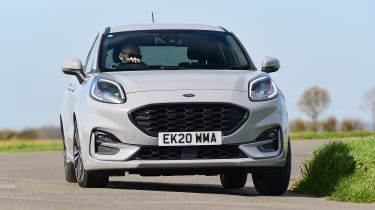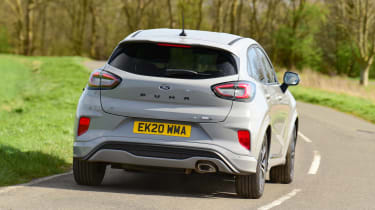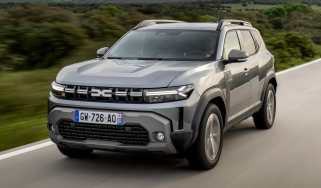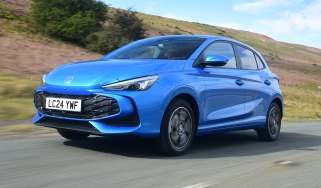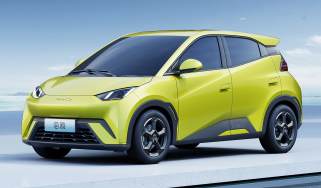Ford Puma - Engines, performance and drive
The Ford Puma’s proven 1.0-litre EcoBoost units are a known quantity, but the mild-hybrid system isn’t flawless

The Ford Puma continues the brand’s reputation for fun family cars has been sealed with recent generations of models like the Focus and (now discontinued) Fiesta, while the original Puma – though short-lived – is another prime example of the Blue Oval’s proficiency in chassis development.
Much the same can be said of this Puma SUV, thanks in the main to the Fiesta chassis that sits beneath it. It links up with a solid 1.0-litre EcoBoost engine to deliver a family crossover that’s good to drive.
When we tested the Puma up against the Renault Captur and Peugeot 2008, we hailed the Ford as being “easily the best to drive". The driving position is fundamentally sound, and once you’re settled in, you’ll quickly see why the Puma has won plaudits.
Get on the move and the steering feels light – even if you put the Puma into the Sport mode using the drive mode selector. But, it’s well resolved for a car like this, accurate, keen to re-centre and with a great steering ratio. There’s a good level of grip too, so immediately the Puma feels like a crossover that you can flick through corners nicely. The six-speed gearbox is lovely, too, while Ford’s engineers have also done a fine job with the Puma’s suspension.
More reviews
Car group tests
- Ford Puma vs Vauxhall Mokka: two best-selling crossovers clash
- Hyundai Kona N vs Ford Puma ST: 2022 twin test review
In-depth reviews
Long-term tests
Road tests
Used car tests
Even with the sports suspension on the ST-Line model, the damping is very well set up, and it has a decent level of compliance to make long journeys comfortable. It all comes together to give the Puma brilliant composure and the ability to offer an engaging drive.
The Puma ST is based on the sublime Fiesta ST hot hatchback, which means a 1.5-litre three-cylinder turbocharged engine under the bonnet, making the same 197bhp. With 320Nm of torque delivered from just 1,600rpm, it has enough low-down grunt to keep things interesting, while its quick steering helps to inspire confidence along twisty roads. In our Hyundai Kona N vs Ford Puma ST group test, the Puma came out on top. The ST lineup also includes a 168bhp variant with an automatic transmission, which will be the only version available after the facelift. So it remains to be seen whether it’ll be as fun to drive as its predecessor due to torque being slightly down on the manual car at 248Nm.
0-62mph acceleration and top speed
The 1.0-litre EcoBoost engine has been a really strong contender in its various applications over the last few years, and the Puma is another vehicle where this small engine shines. It may no longer be the outright best three-cylinder engine on the market, and some engines – such as the TSI units used in the Volkswagen Group cars – may be more refined these days, but you shouldn’t be disappointed.
The 123bhp and 210Nm torque served up by the base model is enough for most family motoring, propelling the Puma to 62mph in 9.8 seconds and on to a top speed of 119mph.
The only downside to the mild-hybrid system is that to fill the small battery pack with energy, the Puma features a very minor amount of brake energy regeneration. It’s set at a constant, unchangeable level, that’s just about detectable when you lift off the throttle and feel the car slow more quickly than it otherwise would, and takes a little getting used to.
If you need more power, the 153bhp car has you covered. It also has braking recuperation that cannot be altered in strength, but it takes 8.9 seconds to reach 62mph from standstill and goes on to a top speed of 124mph.
The ST range starts with a 168bhp auto version, which is predictably a little slower than the more potent 197bhp 1.5-litre performance model. The former manages the 0-62mph sprint in 7.4 seconds and will do 130mph flat out, while the latter dispatches the same sprint in 6.7 seconds, and achieves a 137mph maximum.
Which Is Best
Cheapest
- Name1.0 EcoBoost Titanium 5dr
- Gearbox typeManual
- Price£20,415
Most Economical
- Name1.0 EcoBoost Titanium 5dr
- Gearbox typeManual
- Price£20,415
Fastest
- Name1.5 EcoBoost ST 5dr
- Gearbox typeManual
- Price£31,435
